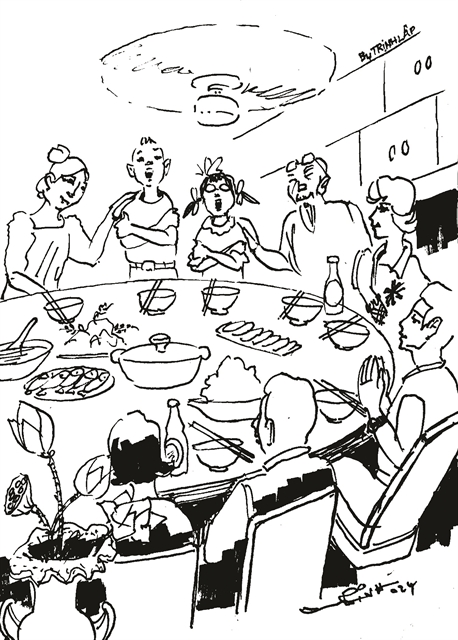 Talk Around Town
Talk Around Town

 |
| Illustration by Trịnh Lập |
by Nguyễn Mỹ Hà
What you discuss during family meals can reveal the strength of your family bonds or where they might need some attention.
Lately, our teenager has been steering our mealtime conversations towards the latest US presidential debates. Why would we be interested? Honestly, we couldn't care less. But our CHILD is learning debating skills, strategies, and tactics in preparation for an English proficiency test. After listening to the debate between the current president and the candidate, all I could advise her was to find better sources for learning debating skills, as this wasn't a great example.
It's unusual for such topics to dominate our dinner conversations, especially in summer. During the school year, our discussions typically revolved around school, homework, music lessons, sometimes conflicts or misunderstandings among her friends, and occasionally, problems in friends' families. We recently had to support a friend whose parents were undergoing a tough divorce; we were relieved when it finally ended, and the children found peace.
Once, our child came home saying, "I ran into my friend in the school lift, and she told me, 'I've just become fatherless!'" That was her way of saying her father had found happiness elsewhere and was leaving her mother and siblings.
The subjects of these seemingly private matters would never know they became dinner table topics for strangers.
For a while, we tolerated all these things our children brought up. But eventually, we decided to focus only on essential family matters: our health, our studies, and how to strengthen our family bonds — even if that means debating, or as we prefer to call it, discussing.
"How was school today?" I'd ask, only to receive a flood of answers about school events, favourite teachers, cafeteria food, and whose birthday was coming up next month.
Each month, the children would have activities at school, like traditional festivals where they made simple sweets with the help of the Parent Association. They also went on trips to farms, getting muddy while trying to catch chickens or playing outdoor games. Sometimes, the children had so much to share that we had to set rules: they had to raise their hands to speak, and everyone else had to listen until the speaker finished. "Mum, are you listening?"
Yes, I heard them talk all the time, though sometimes my busy mind would miss a sentence or two, and they'd have to repeat themselves, which they didn't appreciate. But it was good for them to learn to summarise their stories while getting their main points across.
"Hey, kids," I once said, "I've made this great meal for us, and the last thing I want to hear about is other families' issues. I don't know them, and I'd rather focus on what makes you smile or what upsets you."
Children today are very opinionated. "My physics teacher is so cool", "My maths teacher complimented me today," or "My English teacher corrected my pronunciation, Mum! You sound so American; we need to stick to British accents!" is their friendly advice.
Most of us speak English with a Vietnamese accent, and some may sound more American because they watch many movies. We only imitate British accents for fun.
"Please finish your rice before you talk," is a common reminder during meals. When we want to lighten the mood, we say it in a British accent.
Today, when we manage to have a family meal together, we tend to focus more on daily routines. In the past, our parents used mealtime as an opportunity to teach life lessons, which could be quite intense. Mealtime has become a serious educational time once again.
"When you pick up a full bowl of rice, remember each grain bears countless hardships," or "Don't just pick out the best piece; think about others who might want it too."
As children, we found these moral teachings during meals quite intimidating. But when else would they have the chance to teach us? Our parents were busy making ends meet; mealtime was our only opportunity to gather as a family.
Vietnamese parents have various ways of imparting these morals during meals. Mothers often use direct commands to get things done. "Mix the rice evenly before serving," she might say. "Don't just pick the best pieces; everyone needs to share. Sit up straight and don't lean over your food!"
When kids don't want to clean up, fathers might gently say, "If cleaning is so hard, maybe I'll do it." Then suddenly, all the siblings rush to clean up.
But the most frustrating thing at mealtime when I was a child was when you were finally ready to eat, your parents would send you off for some last-minute task — "Can you get me a chilli? Can you grab Daddy a beer? Do we have any pickles for the pork caramel?" Sometimes these interruptions made us lose our appetite. But looking back, those were probably some of our happiest times, and we always remember them with a smile.
In northern Việt Nam, during a big family meal, the youngest seated by the meal tray traditionally invites everyone else to eat: "Grandma, Grandpa, parents, uncles, aunties, brothers, and sisters, please join me." By the time everyone is invited, there might not be much food left!
It's a rule that the youngest shouldn't say, "Everyone, please eat!" Our loving parents would promptly remind us, "We all have names; who is 'everyone'?"
Perhaps today, with only nuclear families eating together, you don't have to juggle forgotten items or invite a family of 10 to join you at the table while we talk during meals. VNS